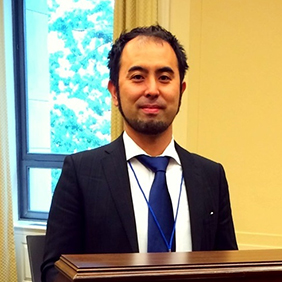2024 JFIPP Research Fellow - Masahiko Haraguchi

Masahiko Haraguchi
Postdoctoral Research Fellow, Department of Global Health and Population, Harvard T.H. Chan School of Public Health, Harvard University
[Project Title]
Making an Environmental Surveillance for Infectious Diseases Work for the Indo-Pacific Region
Project Summary
This project assesses the environmental surveillance system’s effectiveness, social acceptance, and adaptability for monitoring an infectious disease outbreak to prepare for future pandemics. The technology to monitor SARS-CoV-2 in the environment, such as through wastewater, is now actionable in countries with advanced sewage systems. Also, the European Union, with other partners, leads the Global Consortium for Wastewater and Environmental Surveillance for Public Health to establish a global framework to conduct environmental surveillance for public health purposes. However, broader implications of the surveillance systems remain underexplored.
Environmental surveillance is advantageous over conventional surveillance systems because it detects outbreaks early in a cost-effective way and estimates infection trends through monitoring of asymptomatic infections. However, challenges persist. Notably, implementation standards vary, lacking national, regional, or global harmonization. Consequently, environmental and wastewater surveillance data remain siloed and are not as broadly shared as other surveillance data. Given the region's significance for future pandemics, there is an urgent need in the Indo-Pacific to understand how to deploy environmental and wastewater surveillance for timely infectious surge detection and novel virus detection for infectious diseases.
This project adopts a socio-technical approach to the systems, treating wastewater detection systems not just as tools, but as a societal system where technology interacts with societal components. The project’s core components include:
- 1.Analyzing the environmental and wastewater monitoring systems as a source for infection trend insights that complement conventional systems.
- 2.Proposing risk communication strategies to promote behavior change informed by wastewater surveillance data.
- 3.Addressing disparities arising from the pandemic and identifying social determinants.
- 4.Assessing the wastewater system from a socio-technical perspective that links society’s needs with technical innovations.
- What We Do Top
- Arts and Cultural Exchange [Culture]
- Japanese-Language Education Overseas [Language]
- Japanese-Language Education Overseas [Language] Top
- Learn Japanese-language
- Teach Japanese-language
- Take Japanese-Language Test
- Know about Japanese-language education abroad
- The Japanese-Language Institute, Urawa
- The Japanese-Language Institute, Kansai
- Japanese-Language Programs for Foreign Specified Skilled Worker Candidates
- Japanese Language Education for Japanese Children Resident Overseas and for the Descendants of Migrants
- Archives
- Japanese Studies and Global Partnerships [Dialogue]
- JF digital collection
- Other Programs / Programs to Commemorate Exchange Year
- Awards and Prizes
- Publications
